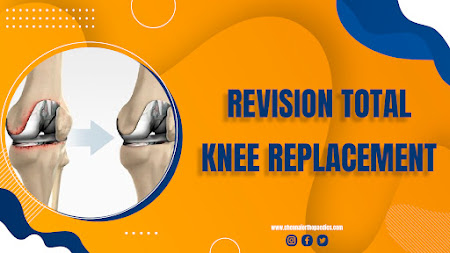Date :25-Nov-2022
 Total Knee Arthroplasty (TKR) or total knee replacement is a very common procedure used to treat knee-related problems. This method is extremely successful in relieving pain and helping patients live active, fulfilling life. TKR also has good longevity in most patients. However, in some cases, the replaced knee might end up having some problems. Though very rare, these instances are unavoidable. In these cases, the faulty knee implants will have to be replaced in a procedure called revision total knee replacement.
Total Knee Arthroplasty (TKR) or total knee replacement is a very common procedure used to treat knee-related problems. This method is extremely successful in relieving pain and helping patients live active, fulfilling life. TKR also has good longevity in most patients. However, in some cases, the replaced knee might end up having some problems. Though very rare, these instances are unavoidable. In these cases, the faulty knee implants will have to be replaced in a procedure called revision total knee replacement.
Madhavi (name changed) underwent a bilateral staged complex primary TKR 2 years back at the age of 48 to treat inflammatory arthritis. However, post-surgery her knee felt slightly loose and was therefore advised to wear knee braces for a few months to tighten her soft tissues. Unfortunately, due to the COVID lockdown, she could not visit her doctor for further consultations. Her knee continued to be unstable and Madhavi could barely walk or even stand without her knee braces.
Finally, Madhavi approached Dr. Bharani Kumar Dayanandam, the senior orthopaedic surgeon and trauma consultant at Chennai Orthopaedics. A thorough examination revealed that Madhavi’s knee was completely unstable and she was at a high risk of falling and fracturing her bone and/or implants. Dr. Bharani Kumar suggested a revision total knee replacement to correct this error. “Revision total knee replacement is more complex than a regular TKR due to multiple reasons. The original implant must be removed, special implants must be used as there will be lesser bone than before to work on, bone grafts may have to be placed to support the implants by filling the void caused by bone deterioration, etc,” says Dr. Bharani Kumar.
There are many reasons why a TKR fails. These include misalignment of implants due to incorrect sizes or surgical errors, erosion or wear and tear due to high activity, infections, fractures, stiffness due to the build-up of scar tissues, and instability due to the looseness of soft tissues around the implant, etc.” says Dr. Bharani Kumar. Depending on the cause, a revision total knee replacement might become necessary a few months or a few years after the initial TKR. The rehabilitation and recovery steps for a revision total knee replacement surgery are similar to that of TKR. According to Dr. Bharani Kumar, “In most cases, we begin physiotherapy 24-48 hours after the surgery which can last up to 3 months.”
Madhavi is very happy with the progress she has been making since the bilateral revision knee replacement surgery conducted by the very experienced Dr. Bharani Kumar and his team. “I have been able to walk without knee braces immediately after the surgery,” beams Madhavi. Dr. Bharani Kumar is very optimistic about Madhavi’s recovery. “In Madhavi’s case, the complex primary knee was replaced with a hinged knee as her ligaments were completely lax,” says Dr. Bharani Kumar.
Dr. Bharani Kumar understands the skepticism people feel when they are advised to have a revision total knee replacement. The general attitude is “How will the second time be any better than the first TKR?” However, Dr. Bharani Kumar says that in the hands of an experienced orthopaedic surgeon, revision total knee replacement can correct the problems that arise in the first TKR and thereby improve your quality of life drastically.




 Total Knee Arthroplasty
Total Knee Arthroplasty 








